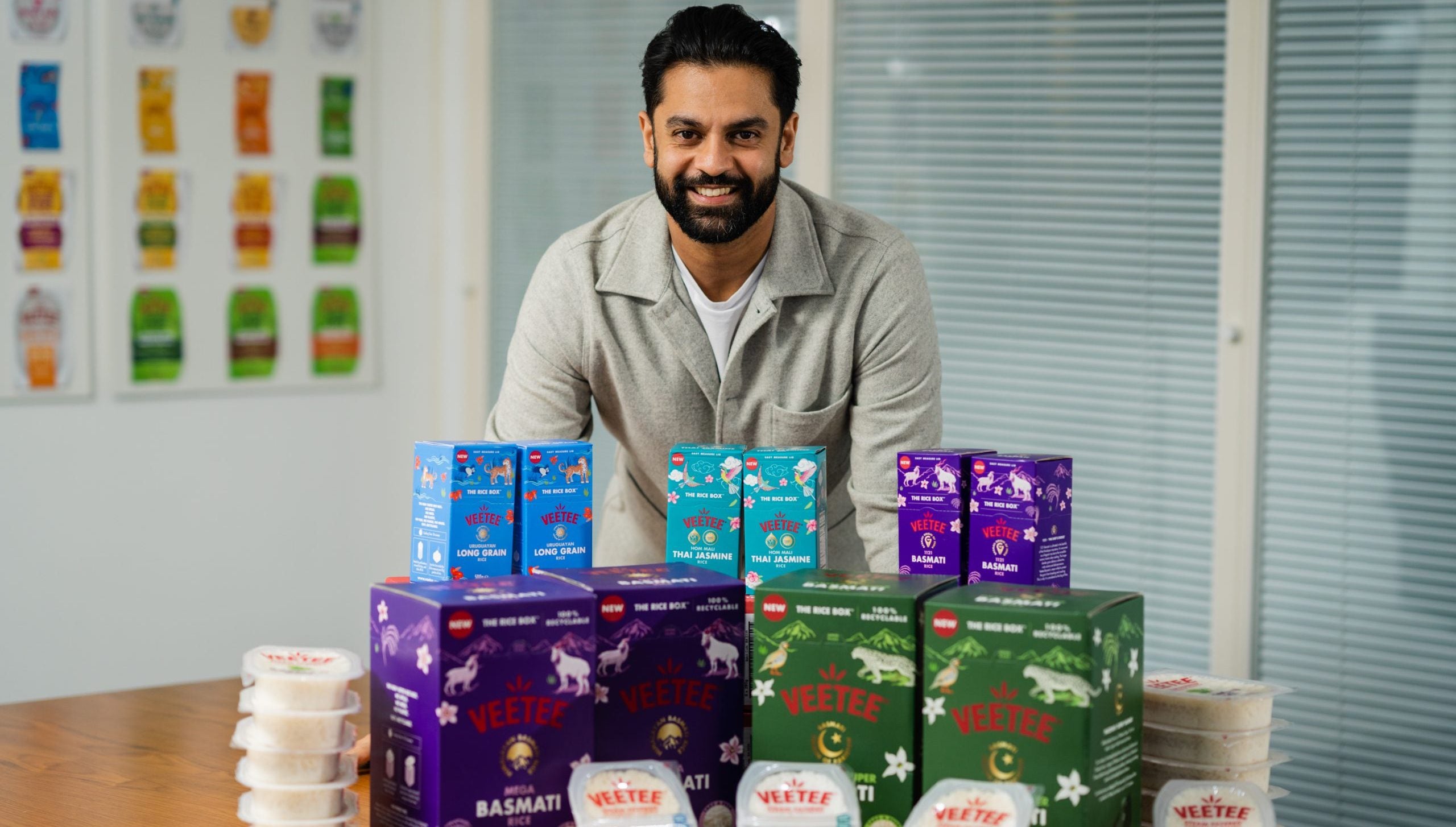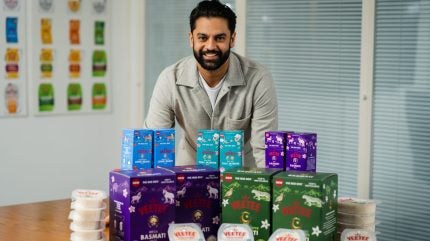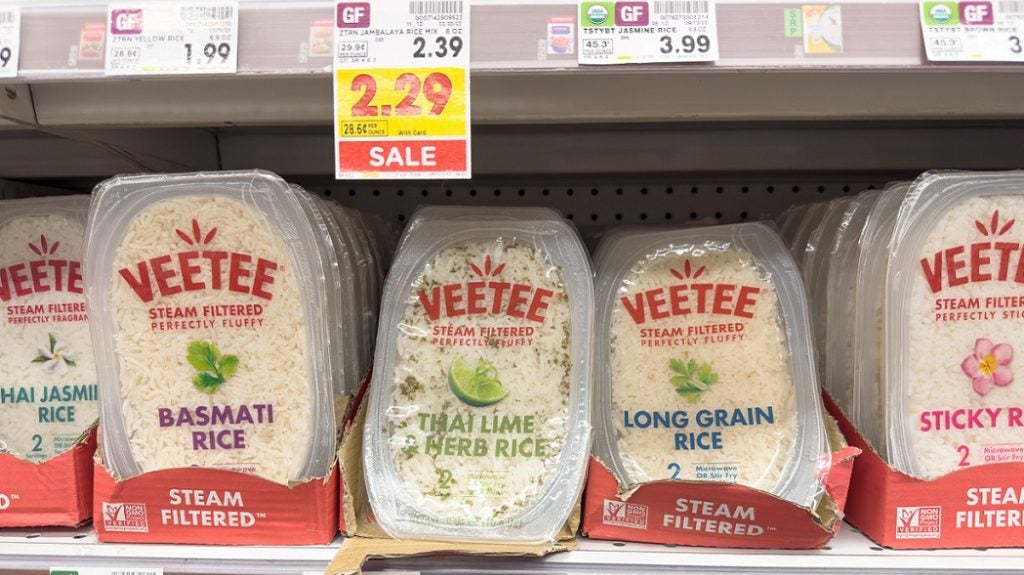

Veetee Foods plans to consolidate its manufacturing capacity in the UK with a new factory as the family business accelerates its shift into convenient meals.
A US plant is also coming on stream to support sales in a market the company entered ten years ago and where momentum is building with a refreshed product offering under the steer of Rajiv Varma.
His father Moni set up the company in 1986, predominately selling varieties of rice, but his son Rajiv, now at the helm, has ambitions further afield and even has his sights on potential M&A down the line.
Based in Rochester in south-eastern England, Veetee Foods posted a total turnover of £140m ($184.3m) in the 2023 financial year and estimates reaching £165m this year.
With the US site slated for operation in 2025, the year could be pivotal and Rajiv tells Just Food’s Simon Harvey the group’s turnover could hit £200m.
Simon Harvey (SH): How has Veetee Foods transitioned?
Rajiv Varma (RV): We were very much a commodity business. When my father started the company, the quickest route to market was doing private-label rice contracts. We had the lion’s share of the major retailers in the UK.
Access the most comprehensive Company Profiles
on the market, powered by GlobalData. Save hours of research. Gain competitive edge.

Company Profile – free
sample
Your download email will arrive shortly
We are confident about the
unique
quality of our Company Profiles. However, we want you to make the most
beneficial
decision for your business, so we offer a free sample that you can download by
submitting the below form
By GlobalData
Then, 16 years ago, we pivoted. That gave birth to our Steam Filtered rice trays, which are flying off the shelves in the UK and the US. That was our first foray moving away from commodity rice. What I wanted to do is move further away and create brands, create meals and moments that would resonate with households around the world.
SH: How is the portfolio set up?
RV: Steam Filtered is our ready-to-eat rice in trays. That’s our fastest-growing product and fastest-growing brand right now.
The Hungry Heads range has just launched, it’s been a couple of months or so, and the early signs are really good.
Noodle Head is a world-first – stir-fried noodles in 60 seconds. We’re manufacturing with fresh ingredients, fresh vegetables, stir-frying the noodles and that’s what you get.
The vast majority of the products under the Heads ranges, as we term it, are meal occasions. We have launched a number of branded products – Pasta Head, Mac ‘n’ Cheese Head, Ramen Head and Soup Head.
SH: Are you selling your brands right across the range in the UK and the US?
RV: We’ve launched them in a big way with Tesco and Ocado do list some of the products. At the start of next year, we’re confident we will have the HungryHeads range listed throughout the UK.
In the US, Steam Filtered is going great guns. Mac ‘n’ cheese and Noodle Head are also listed in the States. We’ve got very active discussions to expand the range and leverage the really good relationships that we have.
SH: What other markets do you serve and any plans for new ones?
RV: We have a 40-acre site in India, which serves the local market and also the Middle East, Australia and South Africa.
I am in the middle of forming our European strategy, which will be run from the UK and will entail getting Steam Filtered into major European retail and the Hungry Heads range. Simultaneously, the big project in the USA will happen as well.
SH: To clarify, once the US site comes on stream, you will have two other plants in the UK and one in Sonipat, India?
RV: We want to consolidate all our sites in the UK. We’ve got two manufacturing sites but we’ve got five in total if you count three storage units. We’ve got ambitions to consolidate into one big 35-acre site very soon. We’re waiting on various planning permissions to come through. In our area, we are the second-largest employer behind British Aerospace.
SH: Is Veetee Foods still a fully family-owned business or have you had to take external funding or sell shares in the company?
RV: Nothing at all. It’s wholly and solely the Varmas. The family is still pushing things forward.
SH: Can you give an idea of what your turnover is and perhaps what growth rates have been in sales?
RV: We’re in double digits across the board.
On every single Steam Filtered tray that we are currently exporting to the US, we have to pay duty. We’ve always been restricted by manufacturing capacity, so once we hit a critical number we felt, ‘right, okay, now it makes sense to lay down our roots and go for it big time’. The size of the prize that we can go after immediately is going to be huge.
We now firmly believe, with the US coming on board, that we cover the growth opportunities, the growth territories, globally.
I can’t quantify it by any number right now, but with our designated lines producing Steam Filtered to begin with, we have licence to really go big, and we’re confident of doing that.
We have a product that’s different and better. If that’s the metric we can start with, then we’re always going to be in a good place. We already have a decent amount of business in the States.
SH: Do you have any longer-term ambitions, such as wanting to be a billion-dollar company in five years or whatever it might be?
RV: Absolutely, 100%. The billion-dollar mark is where we want to be. It’s something tangible, we see it, and that’s what we want to do. We now firmly believe, with the US coming on board, that we cover the growth opportunities, the growth territories, globally. From the product offering perspective, we all feel that this is just the tip of the iceberg.
We will continue to invest in new products, continue to invest in new machinery, supplying and manufacturing great products. We don’t want to do what other manufacturers have done, we always want to push it and be a bit different and be much better.
SH: Is the billion-dollar marker quite a way off?
RV: A billion is a big number but it’s nothing that daunts us. It’s a great target to work towards.
If, within a six- or a seven-year period, if we are touching that, and we can really turbocharge the growth, we’ll have to put a lot of money behind the consumer, which is the most important thing. If the consumer doesn’t know the product, the consumer won’t pick up the product.
I wouldn’t put a firm target on it but that’s still ambitious enough for all of us involved.

SH: When did you first launch in the US?
RV: We started in the States, I would say, close to a decade ago, or just over, and it was with the retail chain HEB. From then, everything was on the up and up.
Now, part of the reshaping of the business that I had a discussion with my Dad about three or four years ago, was rebranding Steam Filtered, so a change of logo, a change of packaging, improving the ingredients, and improving the quality inside the tray.
Once we did that, and had a clearer strategy, clearer picture of what we wanted to do in the US, it started increasing. Hence the decision was made. We need local production in America.
SH: What sales are generated in the US?
RV: Currently, we’re in between the $15-$20m range. We can expand and capture a big chunk of the market there. We want to create a strong return on investment and that’s what we’ll get from our facility there.
SH: Where do you have listings in the US?
RV: We’re with Kroger, Shoprite, Walmart and HEB to name just a few. We have a small team out there and we’re looking to employ new teammates in the States, build the team and replicate essentially there what we’ve done here.
SH: What plans do you have for new products and new markets?
RV: New markets, new products are absolutely something that we will tap into. We have a very good team of development chefs here in the UK. What I have told them to focus on for the next three years, in terms of new products is, I won’t say no to anything.
SH: Are M&A or a public listing open to you?
RV: Acquisitions is something that we do look at. It’s something that I would probably say I will have the capacity to look at from next year on. What I’ve been quite deliberate to do is not have too many spinning plates, and instead, whatever the projects are, that we execute those perfectly.
Next year, I foresee, if there are acquisition targets, and if they make sense, and if we can integrate various businesses into ours, then absolutely we’ll look to do that.

